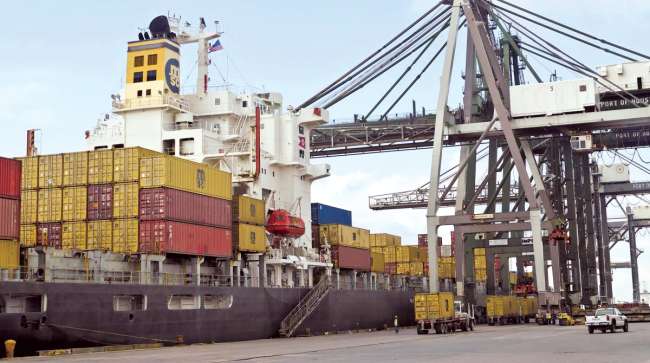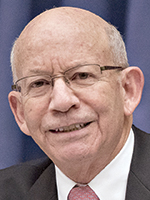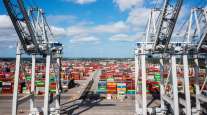Senior Reporter
USDOT Awards $39 Million in Grants to Two Texas Ports

[Stay on top of transportation news: Get TTNews in your inbox.]
Officials at a pair of ports in Texas were awarded more than $39 million in federal grants to assist with expansion initiatives, the U.S. Department of Transportation announced March 10.
Through funding from the Maritime Administration, Port Houston received more than $21.8 million to develop 1,000 linear feet of green space into a wharf at the Bayport Terminal. The project includes installing crane rail to assist with the development of the wharf, according to an advisory by DOT.
The Port of Corpus Christi was awarded $17.6 million to assist with a refurbishment of docks at the Avery Point terminal used by the port’s users to transload petroleum products. The project is meant to double the capacity of a dock used for oil operations.
“Ports are gateways to the world and port infrastructure investments will improve the regional economy, increase productivity and economic competitiveness, and create more jobs,” Transportation Secretary Elaine Chao said in a statement.
Host Seth Clevenger went to CES 2020 to look at the road ahead for electric-powered commercial vehicles. He spoke with Scott Newhouse of Peterbilt and Chris Nordh of Ryder System. Hear a snippet, above, and get the full program by going to RoadSigns.TTNews.com.
Added Maritime Administrator Mark Buzby: “The grants awarded will ensure that these facilities are operating at their highest, most productive capacities.”
The Maritime Administration (MARAD) funding stems from nearly $280 million in grants from the Port Infrastructure Development Program, which seeks to back improvements at port facilities by coastal seaports.
DOT emphasized ports are essential to the country’s supply chain. “Our ports are an unsung economic boon, directly and indirectly providing countless jobs for Americans,” according to background DOT included in its advisory.
Days before announcing the grants, the MARAD had announced the availability of $9.5 million in grant funding for its America’s Marine Highway Program. The program backs the increased use of navigable waterways for the purpose of relieving landside congestion, providing transportation options and increasing the productivity of the surface transportation system.
“Marine highways are an efficient and cost-effective option for moving freight and passengers in America,” Chao said on March 5.
On Capitol Hill Rep. Peter DeFazio (D-Ore.), chairman of the Transportation and Infrastructure Committee, indicated he intends to devote attention to freight programs in an update of the FAST Act highway law. The chairman, who indicated his reauthorization bill would be unveiled this month, recently highlighted concerns related to repairing and expanding a robust freight and passenger rail system.

DeFazio
“The needs of these systems are massive and complex, the result of decades of underinvestment,” DeFazio said during a committee hearing on March 4. He also touched on climate concerns: “Climate change is one of the most important battles of our time. The fact is, the transportation sector is the largest source of greenhouse gas emissions in the U.S. and we need to act quickly to reduce carbon pollution. As rail is one of the cleanest forms of transportation, making significant investments in our rail network should be part of our plan.”
Rep. Rick Crawford (R-Ark.), ranking member on the Railroads, Pipelines, and Hazardous Materials Subcommittee, added, “We must ensure that our freight rail networks can operate effectively, and that they have proper funding for important maintenance and safety upgrades.”
For DeFazio, a challenge in advancing legislation that would update federal highway programs has to do with funding. The Highway Trust Fund, an account key to highway programs, relies on insufficient revenue from the fuel tax. Raising fuel taxes to boost that account lacks the endorsement from a majority of members of Congress and President Donald Trump.
At the hearing with House lawmakers, Ian Jefferies, Association of American Railroads president and CEO, addressed the funding dilemma. As he put it, “An increase in the fuel tax could be helpful as a short-term bridge to a longer-term future that should include a vehicle miles traveled fee or a weight-distance fee.”
The federal 18.4 cents-per-gallon gas tax and 24.4 cents-per-gallon diesel tax has not been increased since 1993.
The 2015 FAST Act highway law expires in September.
Want more news? Listen to today's daily briefing:





